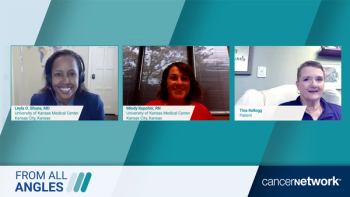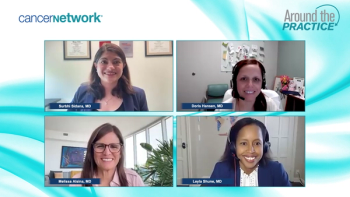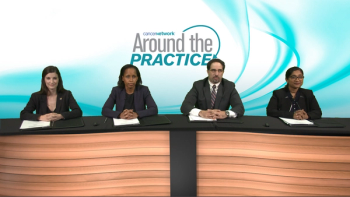Articles by Leyla O. Shune, MD

Panelists discuss how future directions in multiple myeloma include exciting developments like bispecific T-cell engagers (BiTEs) targeting B-cell maturation antigen (BCMA) and GPRC5D, dual-target chimeric antigen receptor (CAR) T therapies, and revolutionary in vivo CAR T approaches, while emphasizing the importance of nurse education and advocacy, compassionate patient-centered care, and a collaborative community approach where academic centers support community oncologists through accessible communication and shared care, ultimately working toward the goal of curing more patients, as evidenced by one-third of ciltacabtagene autoleucel (cilta-cel) recipients remaining in remission 5 years later without additional therapy.

Panelists discuss how comprehensive post–chimeric antigen receptor (CAR) T follow-up care includes proactive immune system support through IVIG (intravenous immunoglobulin) therapy that rapidly improves immune function within days, resulting in patients achieving complete remission with undetectable light chains, eliminated M spike, negative bone marrow for plasma cells, and minimal residual disease (MRD)-negative status, representing the deepest possible remission, while patients report significantly improved quality of life with better stamina, ability to work in their yards, and freedom from daily chemotherapy compared with traditional treatments, with many describing CAR T as “a walk in the park” compared with stem cell transplant and emphasizing their desire to be healed rather than continuously harmed by ongoing chemotherapy regimens.

Panelists discuss how current chimeric antigen receptor (CAR) T therapies for early relapsed/refractory multiple myeloma (R/R MM) include both ciltacabtagene autoleucel (cilta-cel) and idecabtagene vicleucel (ide-cel), both targeting the B-cell maturation antigen (BCMA), with cilta-cel showing superior outcomes in second-line patients compared with ide-cel’s performance in third- and fourth-line settings. They also emphasize that regardless of which CAR T is used, both significantly outperform standard-of-care treatments. Looking toward the future, emerging CAR T therapies are targeting new antigens like GPRC5D on myeloma cells, with phase 2 clinical trials already enrolling patients whose disease returned after initial CAR T treatment, offering hope for sequential CAR T approaches as the field moves toward increasingly immunotherapy-focused treatment strategies.

Panelists discuss how the CARTITUDE-4 clinical trial demonstrated that ciltacabtagene autoleucel (cilta-cel) chimeric antigen receptor (CAR) T-cell therapy significantly outperformed standard-of-care treatments in patients with early relapsed/refractory multiple myeloma (R/R MM), showing higher response rates, complete remission rates, and deeper minimal residual disease (MRD)-negative remissions while also providing superior quality of life with treatment breaks vs continuous therapy requirements, and, most importantly, becoming the first therapy in this patient population to demonstrate improved overall survival and actually prolong life.

Panelists discuss how patients typically respond well to chimeric antigen receptor (CAR) T-cell therapy with manageable adverse effects (AEs), including expected cytokine release syndrome (CRS) presenting as fever, whereas rare neurotoxicity is closely monitored through frequent cognitive testing and treated with steroids and late immune system effects like urinary tract infections (UTIs), respiratory infections, and shingles occur in the first 6 months post treatment but resolve with appropriate medications and prophylactic treatments, with outcomes improving significantly when CAR T is used earlier in treatment lines rather than after patients have exhausted all other options.

Panelists discuss how nursing support for chimeric antigen receptor (CAR) T-cell therapy success involves providing comprehensive educational materials covering everything from collection to survivorship, conducting virtual CAR T classes, and adapting to new outpatient CAR T protocols where patients receive cells and go home with vital sign monitoring equipment for caregivers. The panelists also celebrate recent FDA regulatory changes that reduced required stay times from 4 weeks to 2 weeks and driving restrictions from 8 weeks to 2 weeks, making CAR T therapy more accessible by allowing patients to return to work and normal life sooner, with reduced financial burden on families.

Panelists discuss how shared clinical decision-making in chimeric antigen receptor (CAR) T-cell therapy involves seamless coordination between physicians and nurse coordinators who streamline the referral process for patients after first-line therapy failure, with coordinators managing logistics like condensing multiple appointments, arranging travel and lodging benefits through CAR T companies for out-of-state patients, providing clear communication in “nurse talk” rather than medical jargon, and emphasizing that the referral process is straightforward—encouraging oncologists not to wait but to send patients immediately after 1 line of therapy so the team can handle insurance approval and T-cell collection while patients return home during the 4- to 8-week manufacturing period.

Panelists discuss how patients with relapsed/refractory (R/R) multiple myeloma experience the challenging process of confirming disease recurrence through bone marrow biopsies and PET scans, often struggling with difficult treatment regimens like immunotherapy and daily lenalidomide (Revlimid) that cause severe illness, leading patients to advocate for themselves by researching alternative therapies like chimeric antigen receptor (CAR) T-cell therapy through educational materials and videos, ultimately seeking second-line treatments that offer the appeal of “one and done” therapy with less ongoing chemotherapy compared with traditional lifelong treatment approaches.

Panelists discuss how patients educate themselves about multiple myeloma through hospital pamphlets and magazines, online research, and positive attitude books about cancer while emphasizing the critical importance of peer support and mentorship programs where patients can meet with others who have successfully undergone treatments like stem cell transplants, creating comforting group meetings that help alleviate fear and provide hope by seeing healthy survivors share their stories and demonstrate that recovery is possible.

Panelists discuss how multidisciplinary care coordination for chimeric antigen receptor (CAR) T-cell therapy involves registered nurses serving as support persons and liaisons between academic centers and community oncologists, with streamlined communication through direct cell phone access, telehealth consultations to assess candidacy, and coordinated logistics for pretreatment testing, including PET scans, bone marrow biopsies, brain MRIs, and lumbar punctures, while emphasizing that CAR T approval has expanded from fourth-line treatment in 2022 to second-line therapy in 2024, allowing for faster patient access through insurance approval and outpatient T-cell collection processes.

Panelists discuss how a patient with multiple myeloma initially experienced severe fatigue, hair loss, swelling from kidney dysfunction, and overwhelming pain before being misdiagnosed with lupus, ultimately requiring emergency care where blood work and bone marrow biopsy confirmed both multiple myeloma and amyloidosis, leading to successful treatment with chemotherapy followed by stem cell transplant that achieved 5.5 years of remission monitored through regular blood draws tracking light chain levels.

Panelists discuss how multiple myeloma is a rare blood cancer affecting plasma cells that have gone rogue, causing symptoms like fatigue, kidney dysfunction, and bone pain, with approximately 36,000 new cases diagnosed annually in the US, primarily affecting older patients around 60 to 65 years of age. Although multiple myeloma is highly treatable with great therapy options available, the disease often relapses and requires aggressive early treatment approaches, including emerging immunotherapies that may help cure a larger fraction of patients in the future.

Panelists discuss the growing importance of early integration and collaboration between community oncologists and specialized centers in the evolving chimeric antigen receptor (CAR) T-cell therapy landscape for multiple myeloma, emphasizing timely referrals, coordinated care, and strategic sequencing with other immunotherapies to optimize patient outcomes.

Panelists discuss the essential role of supportive care following chimeric antigen receptor (CAR) T-cell therapy in multiple myeloma, emphasizing infection prevention through prophylaxis, immunoglobulin replacement, and vaccination strategies, along with the importance of coordinated long-term management between CAR T centers and community oncologists to ensure sustained survivorship care.

Panelists discuss the need for consolidation and maintenance strategies following chimeric antigen receptor (CAR) T-cell therapy in patients with high-risk multiple myeloma, highlighting emerging real-world and clinical evidence supporting the use of agents like lenalidomide and bispecific antibodies to extend disease control and improve outcomes in those with historically shorter remissions.

Panelists discuss real-world evidence showing that chimeric antigen receptor (CAR) T-cell therapy is safe and effective in traditionally excluded populations with multiple myeloma, including those with comorbidities or central nervous system (CNS) involvement, emphasizing the role of multidisciplinary care, proactive toxicity management, and growing confidence in extending access to high-risk patients.

Panelists discuss emerging strategies to manage delayed neurotoxicity from chimeric antigen receptor (CAR) T-cell therapy in multiple myeloma, highlighting the predictive value of postinfusion lymphocyte expansion, the potential of early dexamethasone intervention, and the need for continued research and collaboration to refine toxicity prevention and ensure safer, broader use of CAR T in earlier treatment lines.

Panelists discuss the growing support for incorporating chimeric antigen receptor (CAR) T-cell therapy earlier in the multiple myeloma treatment pathway, emphasizing the importance of timely referral and personalized decision-making to maximize patient outcomes before disease progression or comorbidities limit eligibility.

Panelists discuss the critical role of sequencing B-cell maturation antigen (BCMA)-targeted therapies in multiple myeloma, emphasizing that administering chimeric antigen receptor (CAR) T-cell therapy before bispecific antibodies leads to better outcomes, while real-world evidence and emerging guidelines increasingly inform strategic decisions based on treatment timing, disease urgency, and patient-specific factors.

Panelists discuss the emerging real-world use of talquetamab as a bridging therapy before chimeric antigen receptor (CAR) T-cell treatment in patients with advanced multiple myeloma, highlighting its ability to rapidly reduce tumor burden and improve CAR T outcomes despite unique toxicities and emphasizing how clinician-driven innovation is shaping practice ahead of clinical trial data.

Panelists discuss the real-world comparison of ciltacabtagene autoleucel (cilta-cel) and idecabtagene vicleucel (ide-cel) chimeric antigen receptor (CAR) T-cell therapies for multiple myeloma, highlighting cilta-cel’s superior efficacy but higher toxicity and emphasizing the importance of tailoring treatment decisions to individual patient factors such as disease stage, health status, and personal preferences.

Panelists discuss the transformative impact of chimeric antigen receptor (CAR) T-cell therapy on treating relapsed/refractory multiple myeloma (R/R MM) in real-world settings, emphasizing improved patient outcomes, the expanding role of real-world evidence, and the nuanced decision-making required in selecting among newly approved, highly effective immunotherapies.

The expert panel overviews factors to consider with bispecific antibodies and offers closing insights on unmet needs in the multiple myeloma treatment space.

Nausheen Ahmed, MD, gives an overview of BCMA bispecific T-cell engagers used in the treatment of multiple myeloma.

Experts on multiple myeloma discuss the mechanism of action and adverse events for teclistamab and compare CAR T-cell therapy with bispecific T-cell engagers (BiTEs).

The expert panel discusses CAR T-cell therapy options and treatment considerations for patients with multiple myeloma.

Al-Ola Abdallah, MD, presents the case of a patient with multiple myeloma treated with CAR T-cell therapy and teclistamab.

Nausheen Ahmed, MD, and Al-Ola Abdallah, MD, discuss the use of CAR T-cell therapy in patients with transplant-ineligible multiple myeloma.

The expert panel gives an overview of factors that influence treatment decisions in patients with transplant-ineligible multiple myeloma.

Leyla O. Shune, MD, reviews the MAIA trial, which looked at DRd vs Rd in patients with transplant-ineligible multiple myeloma.




